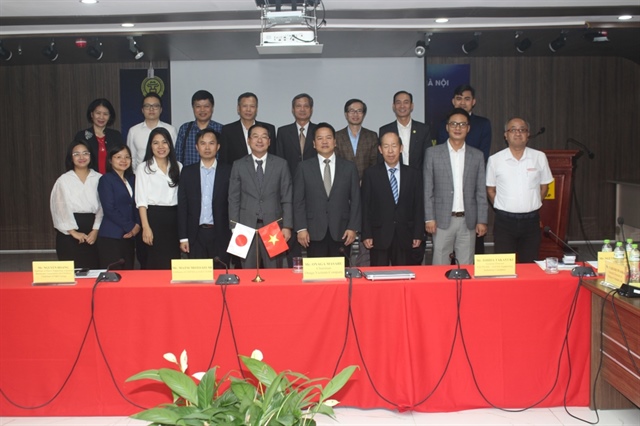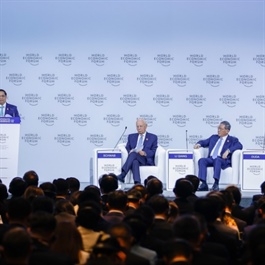Fostering innovation: Promising collaborative venture between Vietnam and Japan
Fostering innovation: Promising collaborative venture between Vietnam and Japan
Japanese firms must balance meticulous preparation with agility in Vietnam's dynamic market by working with local partners. The same principle applies to Vietnamese companies entering Japan.
The fast-changing technological landscape requires adaptation and collaborative efforts, blending traditional cultures with new ideas, for which businesses from Vietnam and Japan should strengthen cooperation to foster innovation and ensure sustainable growth.

Overview of the event. Source: Ngoc Mai/The Hanoi Times |
“This is particularly important as innovation has now become a key driver for economic development and market expansion.”
Chief Representative of the Japan External Trade Organization (JETRO) in Hanoi Takeo Nakajima shared the view at the launch of an interview collection entitled “Advancing Open Innovation Collaboration between Vietnam and Japan” today [June 25].
"Just as sumo wrestlers train extensively for months for a few minutes of intense fight, Japanese companies invest significant effort to ensure a successful product or service launch. A failed launch can be disastrous, requiring months of recovery," Nakajima explained. "In contrast, Vietnam's dynamic and fast-changing business environment demands flexibility and quick adaptation, with constant product refinement necessary for success."
"Japanese firms must balance their meticulous preparation with the agility to navigate Vietnam's evolving market by working with local partners. The same principle applies to Vietnamese companies seeking to penetrate the Japanese market," he continued.
Sharing Nakajima’s view, Chairman of FPT IS Tran Dang Hoa said by leveraging each other’s strengths and addressing market-specific challenges, both sides can create a sustainable and prosperous future.
Hoa noted that bringing a successful model to a country like Vietnam is challenging due to factors such as customer behavior, high price sensitivity, and lower awareness of brand loyalty.
"In Japan, customers may be drawn to a point-bonus system to incentivize repeat purchases of certain products or services, whereas Vietnamese consumers have a preference for discounts," he explained.
But it is still worth a try for the Japanese to look at the Vietnamese market, he said.

A cooperation program on aviation quality management between Vietnamese and Japanese firms in Hanoi. Photo: Khac Kien/The Hanoi Times |
"The appeal of the Japanese market, with its 200 million consumers, is undeniable. For Vietnamese high-tech firms like FPT, it remains the most crucial market," noted Hoa. "Yet, it's essential to recognize that Vietnam is a substantial market in its own right, with a population of 100 million. Moreover, its strategic location makes it an important gateway for Japanese companies looking to expand into Southeast Asia."
"Vietnam and Japan share a relationship described as 'close enough but not too far.' We are similar enough to understand each other, yet distinct from countries in the Middle East or Africa. The gap between us isn't insurmountable. If a Japanese firm succeeds in Vietnam, there's a good chance it will be successful in countries like Indonesia or Malaysia," he explained.
"Moreover, with its growing economy, Vietnam has emerged as the third-largest hub for startups in Southeast Asia, alongside Singapore and Indonesia," Hoa stated, citing data from the 2024 Technology and Innovation Investment Report by the National Innovation Center and Do Ventures Investment Fund.
"Over the past decade, startups in Vietnam have attracted $4.6 billion in investment across nearly 900 deals," he continued. "The economic potential remains vast, with room for growth potentially up to tenfold."
"As the economy expands, new industries and fields emerge, creating opportunities for innovation,” he said.
Hoa noted that Vietnam offers a conducive legal environment for experimenting with new ideas, unlike more regulated environments in developed countries.
“This flexibility makes Vietnam a fertile ground for innovation that can later be exported to Japan or the US," he concluded.























